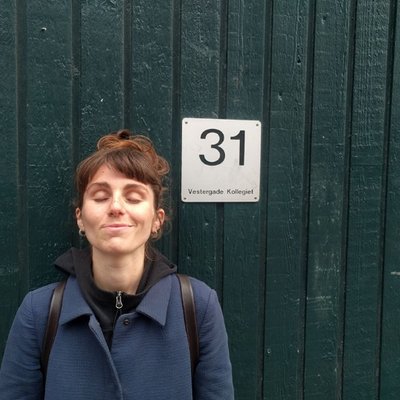Researcher Spotlight #28: Roberta Rocca
This edition of spotlight features a talk with Roberta Rocca, a PhD student at Cognitive Science.

Hi Roberta, what is your background and job role at AU?
I am originally from Italy, but have lived in Denmark the last three years. I have just obtained a PhD here at Aarhus University, where I was part of the Cognitive Science group at the School of Communication and Culture. Before that, I got a MSc in Cognitive Science from the Centre for Mind/Brain Sciences at University of Trento (Italy). During my Masters, I also worked as an intern at the Max Planck Institute for Psycholinguistics in Nijmegen, The Netherlands, and as a research assistant at the Division of Psychology and Language Sciences at University College London.
I was a PhD student at the Department of Linguistics, Cognitive Science and Semiotics (School of Communication and Culture) up until two weeks ago. I am now moving to University of Texas at Austin for a one-year post-doc but planning on keeping active collaborations with AU researchers and moving back in not so long.
What are your main areas of research?
I am mostly interested in language, both in terms of its neural foundations and how we use it (and adapt it to our interlocutors) to facilitate social interactions.
Are you involved with any teaching at the moment?
Not right now, but I have been over the last couple of years. I taught a course in Cognitive Science for MA students in Cognitive Semiotics, I was teaching assistant for the Cognitive Neuroscience course in the Cognitive Science bachelor, and I was guest lecturer in other courses both at the bachelor and masters level.
How did you hear about Cognition and Behavior Lab?
My supervisors and colleagues in the department closely collaborate with COBE Lab. I was introduced to its concept and infrastructure as soon as I started my PhD in September 2016.
Have you used the Lab? If so, what are the benefits for researchers?
I used the lab for two behavioural experiments looking at how we adapt our use of language to other people when we collaborate. The combination of great lab space, availability of lots of equipment for behavioural experiments, a large participant pool and an efficient booking system makes things really easy for experimenters
Is there a particular recommendation you would like to pass on to other researchers? Something you wish you had known before you started, or just a useful trick.
Simple is often good. Trying to frame your questions and/or assumptions in clear and straightforward terms, accessible to other people, is a good test of their quality. Also, it makes it possible to receive feedback on them, which never hurts.
Could you recommend one academic book to fellow colleagues that you think is of great interest?
Somewhat half-way between an academic book and a popular science book, "The Knowledge Illusion" by Philip Fernbach and Steven Sloman was a really enjoyable read.
Away from your research, what do you enjoy doing?
I enjoy reading fiction, occasionally play the bass, really like running, and I'm into art-house movies.